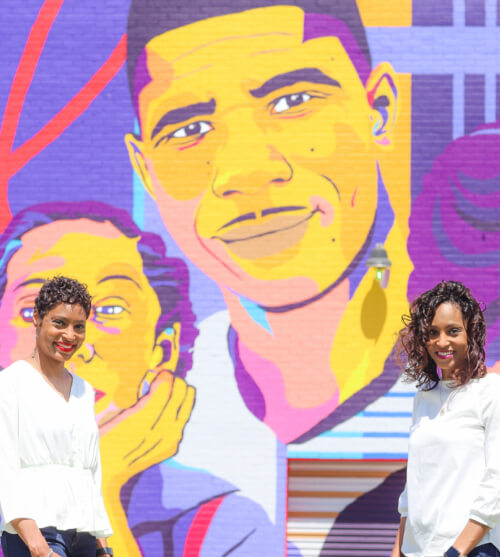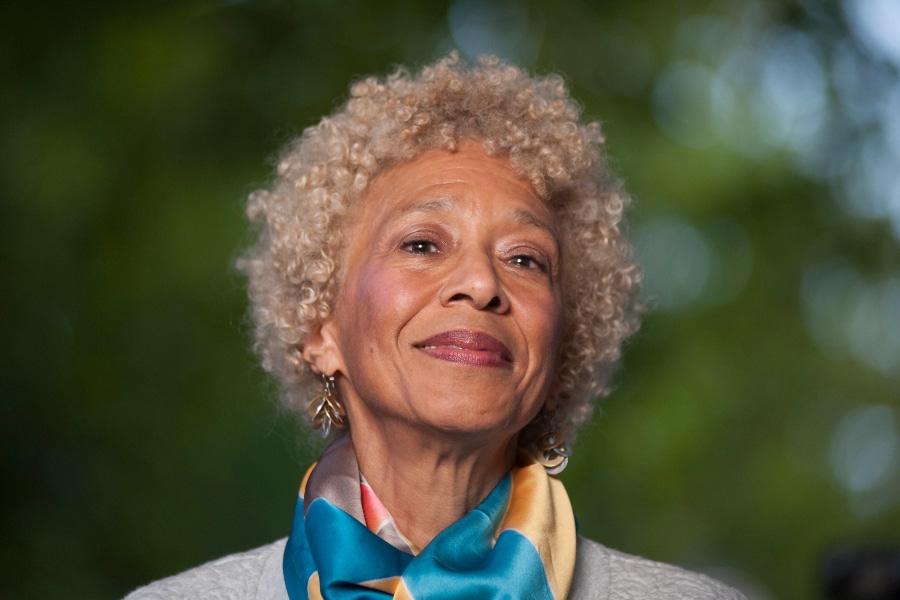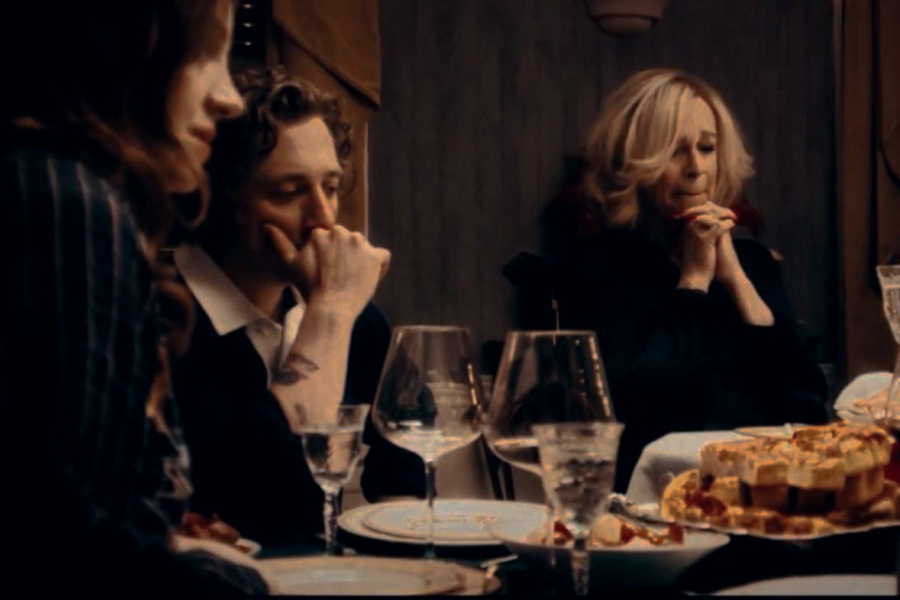In the last three weeks we have witnessed the return of an America that we thought—we hoped—we would never see again. The leaked announcement, by the Supreme Court, of the intention to overturn Roe v. Wade and the racist murders of 13 decent people in Buffalo by a white 18 year old Payton Gendron (followed by several other racist shootings around the country) were astounding reminders that the oppression and ugliness of the past can return in a heartbeat.
I was interviewing esteemed literary critic and memoirist Margo Jefferson (pictured above)—one of our top public intellectuals—about her remarkable new book Constructing A Nervous System, when both of these news items hit. Her book is a kind of companion to Negroland, her much-praised memoir of upper-class Black life in Chicago in the 1950s on up, which won the National Book Critics Circle award.
When you deny people basic rights to their bodies and minds, you are determined to make them stop thinking of themselves as autonomous human beings.
Constructing a Nervous System swims around race, literature, music, and politics, and features characters (both literary and real) with whom she has been emotionally consumed throughout her life—everyone from Willa Cather to Sylvia Plath to Bing Crosby to Ella Fitzgerald to Diana Ross to Ike and Tina Turner. Jefferson plays out their connection to her psyche like a virtuoso pianist doing a quintuple-Liberace. It is as mesmerizing, eloquent, and attention-demanding as Jefferson, 74 and a neighbor of mine in Manhattan’s West Village, is genial and thoughtful—and it amplifies our connections to the complexities and contradictions of gender and race and social class with brilliant, distinctive clarity.
Molly Young of the New York Times called the book, “Ravishing and rigorous…in an artistic tradition that includes Emily Dickinson, Frida Kahlo and Ingmar Bergman: ruthless self-excavation that is scrupulously free of solipsism.”
We spoke of many people—including the difference between “adorable, kittenish, and provocative” Diana Ross and “funkier, sexy” Tina Turner, who “moved like a pugilist, a prize fighter.” And we spoke of Margo’s choice—after graduating Brandeis magna cum laude in 1968 —to move to Manhattan, where she earned her master’s degree and went on to become a book critic for Newsweek and the New York Times. She made the conscious decision not to marry or have children but, instead, “to be a real writer—to find my voice”—like those who most “stirred” her, including Ralph Ellison, James Baldwin, Mary McCarthy, Elizabeth Hardwick. She more than accomplished her goal.
Read More: Owning Up to My Own Racism: A First Step To Creating Change
Roe Reversal and Buffalo: The Double Whammy
It felt almost destined to speak at this particular time to a woman whose personal journey in feminism was so exemplary and whose literary mastery of the complexities of race was so authoritative. So when, just after our talk, the double whammy of the Roe v. Wade news and the heinous Buffalo murders hit I thought to ask her her feelings about them. She wrote:
Legally, psychologically, sexually, and ethnically, these men (and their women allies) want to make women an inferior caste.
“The Supreme Court, as shown by Justice Alito’s brief, is gleefully and viciously planning to make women sub-citizens again. (“Second-class citizen“ doesn’t fully describe it; “second class citizen” never fully described the reach and depth of Jim Crow segregation either.) When you deny people basic rights to their bodies and minds, you are determined to make them stop thinking of themselves as autonomous human beings. You want them and you will force them to act according to the will of their designated superiors. Legally, psychologically, sexually, and ethnically, these men (and their women allies) want to make women an inferior caste. Women are being told that … America will be American again when women have no rights any man is bound to respect. (I quote here from the Dred Scott decision of 1857 which used almost these exact words about black people who defied slavery).
“America racism has always aimed this lethal message at all who are not white and Christian. It’s a declaration of war and it celebrates violence as a legitimate tool for conquest. That 18-year old white man who murdered 13 people in Buffalo (and came equipped to kill many more) is part of a national movement that intends to show black people, other people of color, Jews, Muslims and whoever else they designate, that our claims to liberty and equality will end in defeat and if need be death.”
The Fight This Time

The Cockrell twins with the image of their late uncle, Medgar Evers.
Two other women I know came to my mind after the Buffalo murders. They are twins Courtney and Corrie Cockrell—lawyers who have lived in Mississippi all their lives. At 41, they are slightly younger than Next Tribe’s 45+ demographic, but they are heirs to the country’s Civil Rights struggle as few others are. Their great uncle, Medgar Evers, was assassinated shot dead—at point-blank—outside his house in Jackson, Mississippi on June 12, 1955. The murder was Byron de la Beckwith, who was as gleefully proud to have killed him, in much the same way Gendron was proud to have murdered the people at Buffalo’s Tops Friendly supermarket.
How can you hate someone for something that person has no control over?
Medgar Evers had been the NAACP’s first field secretary. He had been a proud World War II veteran. He was an integration warrior who had risked his life numerous times. His cold-blooded assassination earned national headlines and break-through TV news coverage—and it stunned and pained the Black community throughout America every bit as much as Martin Luther King’s would stun and pain it years later. King, in fact, had attended his funeral.
I first interviewed Courtney and Corrie on the day of Barack Obama’s election to the Presidency. It was a heady day, marked by a satisfying contrast between before and after. They spoke of how they, lifelong Mississippians, had grown up understanding the legacy of hate. Their mother Carolyn Evers Cockrell, the daughter of Medgar Evers’s brother, Charles, had spoken to them of how “Uncle Medgar used to come over to visit our mom, but only under cover of darkness,” Corrie had told me. If he was seen, the family could be harmed. They told me of how their own father had once popped out his false front teeth to show them how he had lost his real ones after he had gotten beaten up trying to integrate a white school in the mid-1960s.
Corrie and Courtney had lived through the gloweringly proud de la Beckwith’s exonerations. He was acquitted once, then a second time—both times, by all-white-male juries. They saw the cruelty and lawlessness of the past intrude on and briefly dominate the present by way of those acquittals. The year before the twins started high school, de la Beckwith was finally convicted, but even then he was gleeful. Thirty-one years after he killed Evers, he had given a post-trial interview and “smirked when he showed how to fire” a gun, Courtney had told me. “You could still see the hatred in his face after all those years.” It was incomprehensible to them. “How can you hate someone for something that person has no control over?”
Hope Rising…and Crashing
Still–despite the lingering presence of this ugly past, the women had experienced the arc of progress in Mississippi, and they were proud of it. Both had attended the University of Mississippi at Oxford—Corrie to get her law degree; Courtney, her second bachelors. The school had a terrible legacy of racism. Ole Miss was the school where a mob of vicious white protesters had gathered when Black student James Meredith entered as a student in 1962; the National Guard had to accompany him. Things had evolved enough from the past decades of racism that there was a plaque honoring their grand uncle at Ole Miss and a scholarship established in his name—the Cockrells had been excited by this. The day of Obama’s election the Cockrells had been buoyed by positivity—we all had been. America’s first Black president! They had waited all their lives for that moment.
That hate crime shows that we are in so many ways still fighting battles that he— and so many others—fought in 1963.
The next time I spoke to them, two years ago—just after they had marched in a peaceful, integrated march in Jackson to protest the killings of George Floyd, Breonna Taylor, and Ahmaud Arbery—they were still buoyed, this time at the good-willed determination, demonstrated by so many in the country, to obliterate the racism that had suddenly peaked.
But when I checked in with them the other day I discovered something horrifyingly ironic and tragic: Payton Grendon’s oldest victim, a woman, was distantly related to the Evers family. “Right after the shootings we learned from our godmothers Margaret Whitfield and Millie Washington that Ruth Whitfield had been killed. She was our godmothers’ cousin,” Corrie said.
A community-active woman whose son, Garnell Whitfield Jr., was the former fire commissioner of Buffalo, Whitfield was shot dead while taking a short trip to Tops Market, in the middle of her visit to the nursing home where her 86-year-old husband lived. “So many of the victims were elderly people who had seen and survived a lot of dark eras in this country, only to succumb to the hatred of a white supremacist—in 2022,” Corrie said to me. “This incident is so deeply disturbing. How could a teenager be so consumed with hate that he refused to see the humanity in the people he murdered, rather than considering that the people he murdered likely wanted similar things in life as he did?
Working Tirelessly…Again
“Days from now, on June 12, we will be marking the 59th anniversary of the assassination of Uncle Medgar. But that hate crime shows that we are in so many ways still fighting battles that he— and so many others—fought in 1963.”
The Whitfield family has retained prominent civil rights lawyer Ben Crump to speak for them. He has issued strong statements, making the point that people who “curate” hate on the internet and on cable TV should be held as accountable as Grendon.
Humanity has no color.
As for Corrie and Courtney, they are feeling, they tell me, “sadness and anger.” How awful that “here, in 2022, we are still striving for our humanity to be seen and valued.”
They continue in a joint statement: “It’s important that we recognize the power of our vote and the power of our speech. We should always strive to be intentional and responsible with our words because they have consequences. Ultimately, most of us, regardless of race, want the same things in life and we waste valuable time focusing on the things that we differ on.
Humanity has no color. Hate and progress are incompatible because when you focus on hate you can only go backwards.
We are hopeful because we see the dedication of so many activists, advocacy groups, and average citizens who are working tirelessly to educate and shine a light on these important issues.”
Read More: After 40 Years of Marching, Why We Have to do it Again





















0 Comments